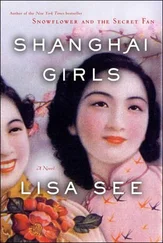Lisa See - Peony in Love
Здесь есть возможность читать онлайн «Lisa See - Peony in Love» весь текст электронной книги совершенно бесплатно (целиком полную версию без сокращений). В некоторых случаях можно слушать аудио, скачать через торрент в формате fb2 и присутствует краткое содержание. Жанр: Старинная литература, на английском языке. Описание произведения, (предисловие) а так же отзывы посетителей доступны на портале библиотеки ЛибКат.
- Название:Peony in Love
- Автор:
- Жанр:
- Год:неизвестен
- ISBN:нет данных
- Рейтинг книги:4 / 5. Голосов: 1
-
Избранное:Добавить в избранное
- Отзывы:
-
Ваша оценка:
- 80
- 1
- 2
- 3
- 4
- 5
Peony in Love: краткое содержание, описание и аннотация
Предлагаем к чтению аннотацию, описание, краткое содержание или предисловие (зависит от того, что написал сам автор книги «Peony in Love»). Если вы не нашли необходимую информацию о книге — напишите в комментариях, мы постараемся отыскать её.
Peony in Love — читать онлайн бесплатно полную книгу (весь текст) целиком
Ниже представлен текст книги, разбитый по страницам. Система сохранения места последней прочитанной страницы, позволяет с удобством читать онлайн бесплатно книгу «Peony in Love», без необходимости каждый раз заново искать на чём Вы остановились. Поставьте закладку, и сможете в любой момент перейти на страницу, на которой закончили чтение.
Интервал:
Закладка:
She let her voice trail off. I should have hurried on, but the opera meant so much to me that I stayed, lingering out of sight behind the twisted trunks of a wisteria vine.
“There is no public here,” Baba said. “This will not be some open affair where women disgrace themselves by sitting among men. You will be hidden behind screens.”
“But outside men will be within our walls. They may see our stockings and shoes beneath the screen. They may smell our hair and powder. And of all the operas, you have chosen one about a love affair that no unmarried girl should hear!”
My mother was old-fashioned in her beliefs and her behavior. In the social disorder that followed the Cataclysm, when the Ming dynasty fell and the Manchu invaders took power, many elite women enjoyed leaving their villas to travel the waterways in pleasure boats, write about what they ( 4 )
saw, and publish their observations. Mama was completely against things like that. She was a loyalist—still dedicated to the overthrown Ming emperor—but she was excessively traditional in other ways. When many women in the Yangzi delta were reinterpreting the Four Virtues—virtue, demeanor, speech, and work—my mother constantly chided me to remember their original meaning and intent. “Hold your tongue at all times,” she liked to say. “But if you must speak, wait until there is a good moment. Do not offend anyone.”
My mother could get very emotional about these things because she was governed by qing: sentiment, passion, and love. These forces tie together the universe and stem from the heart, the seat of consciousness.
My father, on the other hand, was ruled by li —cold reason and mastered emotions—and he snorted indifferently at her concern that strangers were coming.
“You don’t complain when the members of my poetry club visit.”
“But my daughter and my nieces aren’t in the garden when they’re here! There’s no opportunity for impropriety. And what about the other families you’ve invited?”
“You know why I invited them,” he spat out sharply, his patience gone.
“Commissioner Tan is important to me right now. Do not argue further with me on this!”
I couldn’t see their faces, but I imagined Mama paling under his sudden severity; she didn’t speak.
Mama managed the inner realm, and she always kept fish-shaped locks of beaten metal hidden in the folds of her skirts in case she needed to secure a door to punish a concubine, preserve bolts of silk that had arrived from one of our factories for home use, or protect the pantry, the curtain-weaving quarters, or the room set aside for our servants to pawn their belongings when they needed extra money. That she never used a lock unjustly had earned her added respect and gratitude from those who resided in the women’s chambers, but when she was upset, as she was at this moment, she fingered the locks nervously.
Baba’s flash of anger was replaced by a conciliatory tone he often took with my mother. “No one will see our daughter or our nieces. All the proprieties will be maintained. This is a special occasion. I must be gracious in my dealings. If we open our doors this one time, other doors may soon open.”
“You must do what you think best for the family,” Mama conceded.
I took that moment to scurry past the pavilion. I hadn’t understood all ( 5 )
that had been said, but I really didn’t care. What mattered was that the opera would still be performed in our garden, and my cousins and I would be the first girls in all Hangzhou to see it. Of course we would not be out among the men. We would sit behind screens so no one could see us, as my father said.
By the time Mama entered the Spring Pavilion for breakfast, she had regained her usual composure.
“It doesn’t show good breeding for girls to eat too quickly,” she cautioned my cousins and me as she passed our table. “Your mothers-in-law will not want to see you eat like hungry carp in a pond—mouths open with yearning—when you move to your husbands’ homes. That said, we should be ready when our guests arrive.”
So we ate as hurriedly as we could and still appear to be proper young ladies.
As soon as the servants cleared the dishes, I approached my mother.
“May I go to the front gate?” I asked, hoping to greet our guests.
“Yes, on your wedding day,” she responded, smiling fondly as she always did when I asked a stupid question.
I waited patiently, knowing that palanquins were now being brought over our main threshold and into the Sitting-Down Hall, where our visitors would get out and drink tea before entering the main part of the compound. From there, the men would go to the Hall of Abundant Elegance, where my father would receive them. The women would come to our quarters, which lay at the back of the compound, protected from the eyes of all men.
Eventually, I heard the lilting voices of women as they neared. When my mother’s two sisters and their daughters arrived, I reminded myself to be modest in appearance, behavior, and movement. A couple of my aunts’
sisters came next, followed by several of my father’s friends’ wives. The most important of these was Madame Tan, the wife of the man my father had mentioned in his argument with my mother. (The Manchus had recently given her husband a high appointment as Commissioner of Imperial Rites.) She was tall and very thin. Her young daughter, Tan Ze, looked around eagerly. A wave of jealousy washed over me. I had never been outside the Chen Family Villa. Did Commissioner Tan let his daughter pass through their family’s front gate very often?
Kisses. Hugs. The exchange of gifts of fresh figs, jars of Shaoxing rice wine, and tea made from jasmine flowers. Showing the women and their daughters to their rooms. Unpacking. Changing from traveling costumes ( 6 )
to fresh gowns. More kisses. More hugs. A few tears and lots of laughter.
Then we moved to the Lotus-Blooming Hall, our main women’s gathering place, where the ceiling was high, shaped like a fish tail, and supported by round posts painted black. Windows and carved doors looked out into a private garden on one side and a pond filled with lotus on the other. On an altar table in the center of the room stood a small screen and a vase.
When spoken together, the words for screen and vase sounded like safe, and we women and girls all felt safe here in the hall as we took chairs.
Once settled, my bound feet just barely floating on the surface of the cool stone floor, I looked around the room. I was glad I’d taken such care with my appearance, because the other women and girls were dressed in their finest gauze silk, embroidered with patterns of seasonal flowers. As I compared myself to the others, I had to admit that my cousin Lotus looked exceptionally beautiful, but then she always did. Truthfully, we all sparkled in anticipation of the festivities that were about to descend on our home. Even my chubby cousin Broom looked more pleasing than usual.
The servants set out little dishes of sweetmeats, and then my mother announced an embroidery contest, the first of several activities she’d planned for these three days. We laid our embroidery projects on a table and my mother examined them, looking for the most intricate designs and skillful stitches. When she came to the piece I’d made, she spoke with the honesty of her position.
“My daughter’s needlework improves. See how she tried to embroider chrysanthemums?” She paused. “They are chrysanthemums, aren’t they?”
When I nodded, she said, “You’ve done well.” She kissed me lightly on the forehead, but anyone could see I would not win the embroidery contest, on this day or ever.
By late afternoon—between the tea, the contests, and our anticipation about tonight—we were all fidgety. Mama’s eyes swept through the room, taking in the wiggling little girls, the darting eyes of their mothers, Fourth Aunt’s swinging foot, and pudgy Broom pulling repeatedly at her tight collar. I clasped my hands together in my lap and sat as still as possible when Mama’s eyes found me, but inside I wanted to jump up, wave my arms, and scream my exhilaration.
Читать дальшеИнтервал:
Закладка:
Похожие книги на «Peony in Love»
Представляем Вашему вниманию похожие книги на «Peony in Love» списком для выбора. Мы отобрали схожую по названию и смыслу литературу в надежде предоставить читателям больше вариантов отыскать новые, интересные, ещё непрочитанные произведения.
Обсуждение, отзывы о книге «Peony in Love» и просто собственные мнения читателей. Оставьте ваши комментарии, напишите, что Вы думаете о произведении, его смысле или главных героях. Укажите что конкретно понравилось, а что нет, и почему Вы так считаете.












